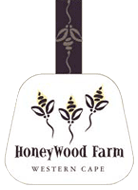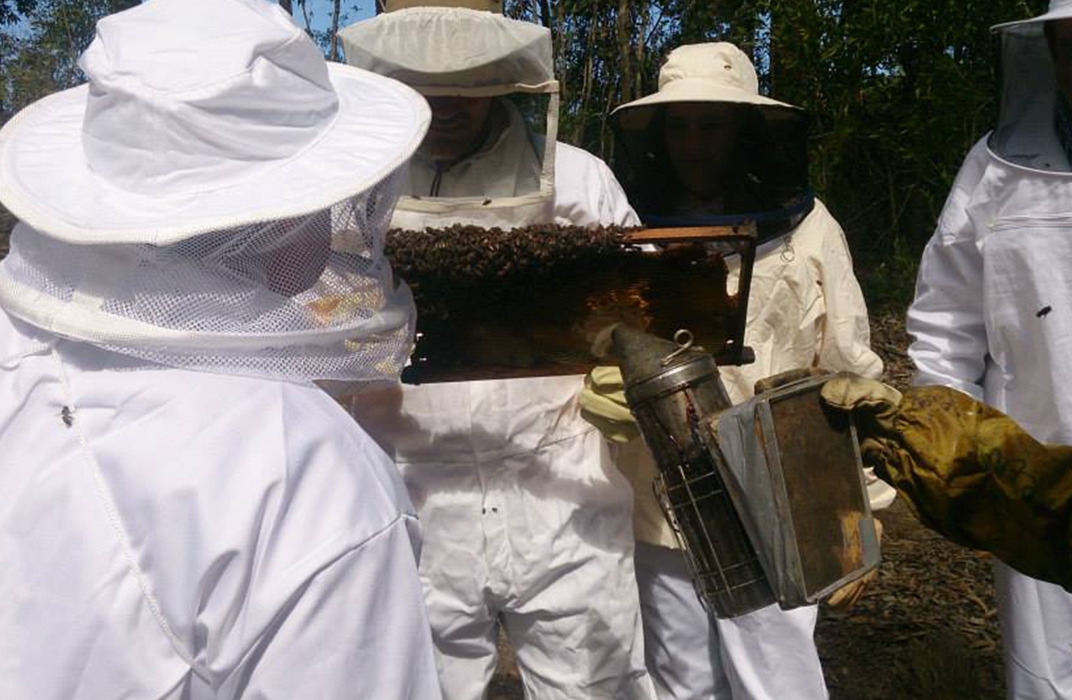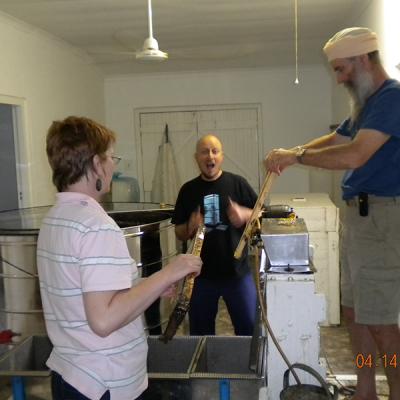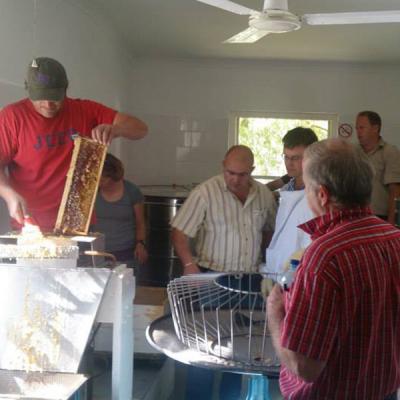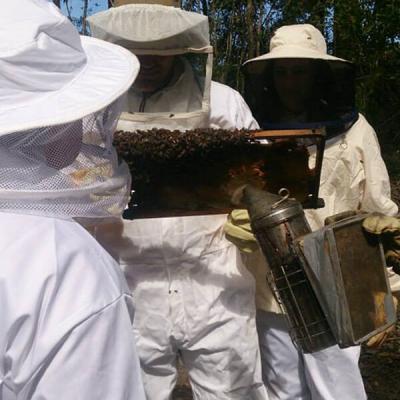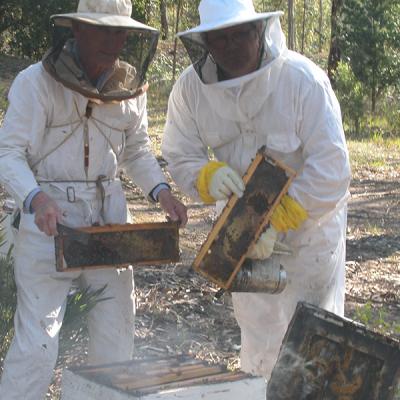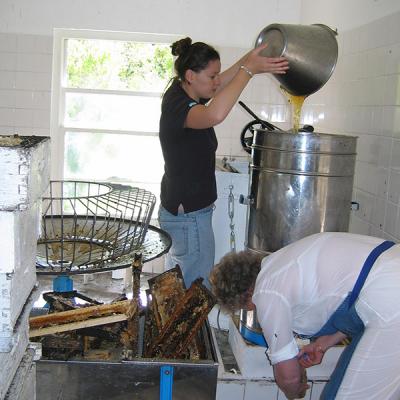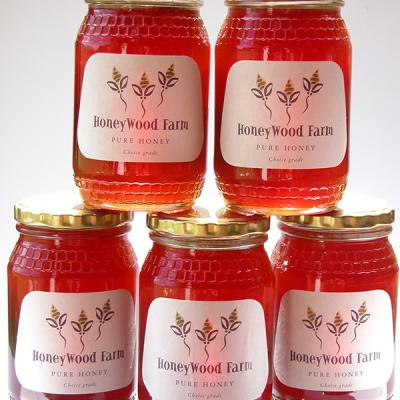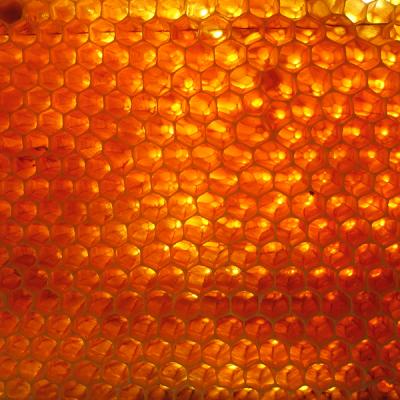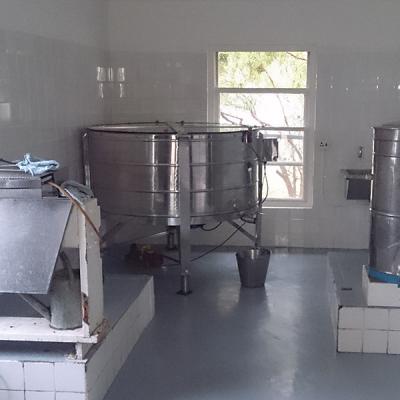Honeywood is a working honey farm - producing delicious fynbos honey which is available for guests and retailers from the farm. We also deliver to certain outlets in Cape Town and Johannesburg. All honey produced is from John's bees and is either raw (unheated) or warmed to sell as choice grade honey. The farm also has cattle and a few sheep, with experimental plantings of olives and honeybush tea.
Courses on beekeeping are offered on the farm on demand - usually in Winter / early Spring. Courses include basics of beekeeping, pollination and queen rearing. The venue is ideal for interested beekeepers and artists as partners are welcome to share the experience and enjoy the beautiful surroundings while courses are in progress.
Honey – some tips on buying the best.
Honey has been produced for as long as the honeybee has inhabited the earth, which is far longer than man’s existence. Bees developed some 35 million years ago and man began to develop some 600000 years ago. On a time scale man’s history would represent the smallest tip of the finger compared to its whole length for the bee. For those who refuse to accept any form of evolution then you will be well enough versed in Biblical passages to understand that honey and bees have been part of the human psyche as long as we have been on earth. Samson eating honey out of the lion’s mouth, Proverbs constant reference to honey, ‘eat honey for it is good’ and honey mentioned in association with Israel as the ‘land of milk and honey’. Interesting that there is no mention of honeybees in the ark as Noah may have had difficulty coping with a swarm of bees with all the other animals! The Koran also has frequent reference to honey and few Muslim homes would permit their pantries to run out of honey. Even the children’s nursery rhyme ‘The Song of Sixpence’ has the queen ‘eating bread and honey’. Honey has been frequently been used as a food supplement for good nutritional reasons but it also creates a marketing focus which appeals to all and helps to sell the product. The appeal of honey is universal.
The magic of the honey association with mankind has resulted in people having a romantic link to the product, but with rather a dismal understanding of the value and real qualities of honey. Everyone associates sweetness with honey but very few know very much about it. It is time that honey bottlers and beekeepers make an effort to ensure that honey is actually marketed for its value as a food and that the consumer is able to be sure that what he is paying for is the best available product. A host of terms are used in association with honey, which must be gibberish to the potential customer wanting to buy a bottle of honey – raw, granulated, irradiated, chunk to name but a few. What is important when buying a bottle of honey and why should one pay a little extra to be sure that what you are buying is honey at its best?
Honey is a natural sweetener. It consists primarily of fructose and glucose, which are monosaccharaides, and with sucrose and maltose as disaccharides. The advantage of monosaccharaides is that they are readily absorbed by the body and place no strain on its digestive system. In addition honey contains moisture, minerals, proteins and amino acids. Enzymes also appear in honey and are generally thought to be added by the bees as few plant enzymes have been found in honey. These enzymes are damaged by age and temperature. Raw honey is honey which has not been heated and only been filtered through a coarse filter before being settled in a settling tank. It may still contain fine particles of pollen, propolis and wax. It is likely to granulate or crystallize quickly. Often the crystals are broken by being stirred which results in creamed honey. Creamed honey has nothing to do with cream except for a smooth texture and raw honey should be well capped in the comb and ‘ripe’ before it is cropped by the beekeeper. Honey, which is not ripe, is generally thin with high moisture content. There is a test that many people believe is a test for pure honey. They invert the honey bottle and if the resulting bubble moves slowly then the honey is assumed to be pure. The bubble shows the viscosity of honey which is also extremely sensitive to temperature so it is a test of the density of the honey rather than its purity.
There are strict regulations regarding honey labels. The bottle must indicate the grade of honey; its weight and the supplier must be clearly indicated with a contacting address. If the honey is imported then it must have been irradiated and should have the irradiation symbol on the label. The country of origin should also be indicated. Although many countries produce excellent honey, South African honey is of the best in the world. There has also been dumping of inferior honey on the local market from the East. Bee organizations are fighting that this be stopped but cheap inferior product is still being mixed in with local honey. Be sure you buy honey with all the relevant information on its label.
Honey flavour and colour depend on the nectar from which it has been manufactured by the bees. Most people have their favourite type of honey – eucalyptus honey is popular, canola light and white when granulated, fynbos usually rich and dark. Consumers should find a honey they enjoy – remember that dark strong honey’s are good in baking while lighter honey is normally preferred with lemon and hot water or in tea. It is really a matter of taste. You should be invited to sample honey before buying it – rather like wine.
The best advice I can give to ensure that you are buying the best quality is to check with your local beekeeper or the local bee association. Any good beekeeper should welcome you to visit his honey room or apiary or at least be able to explain where his honey has been harvested.
